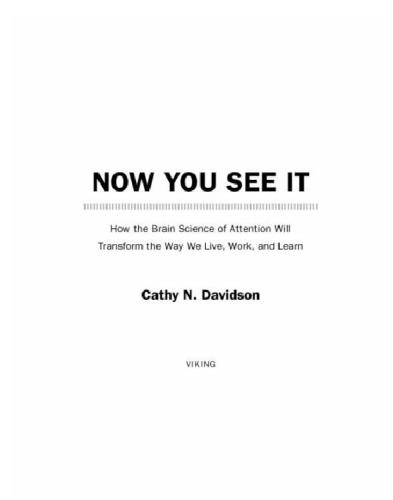
Now You See It
How the Brain Science of Attention Will Transform the Way We Live, Work, and Learn
کتاب های مرتبط
- اطلاعات
- نقد و بررسی
- دیدگاه کاربران
نقد و بررسی

Starred review from May 30, 2011
Davidson (The Future of Thinking) offers a stunning new vision for the future, showing how the latest advances in brain research could revolutionize education and workplace management. Davidson, formerly a vice provost at Duke and now codirector of the HASTAC/MacArthur Foundation Digital and Media Learning Competitions, begins with the concept of "attention blindness," a basic principle of neuroscience stating that individuals only see a portion of the world in front of them. Davidson asks how, whether working alone or collaboratively, we might overcome this deficit and gain a broader perspective on our mental and physical surroundings. She interviews pioneers who have demonstrated amazing success in accomplishing this goal. Her focus ranges from startup charter schools in rural North Carolina to IBM, demonstrating how to move to a world that recognizes the rich interrelationships inherent in the 21st century. Duke, for instance, allowed students to bring digital experience to their (and their professors') educational experience by giving students
iPods and asking them to "dream up learning applications." Davidson has produced an exceptional and critically important book, one that is all-but-impossible to put down and likely to shape discussions for years to come.

August 1, 2011
A preview of the future from an educational innovator.
Davidson (The Future of Thinking, 2010, etc.), who codirects the annual HASTAC/MacArthur Foundation Digital Media and Learning competitions, describes an experiment where most of a group told to count passes between basketball players in a short film fails to spot a person who walks through the scene in a gorilla suit. Too- focused attention can miss something unexpected. The author takes this insight as a key to examine the nature of attention, which she believes has deep roots in the educational system created to fill jobs where workers arrive at a given time and perform a specific task in tight coordination with other workers. As Davidson notes, students who don't respond well to these expectations are pigeonholed as misfits, slow learners, troublemakers or worse. But brain research indicates that the educational establishment is out of step; it is becoming clear that our minds are capable of multitasking to a degree far beyond what the 20th-century assembly-line worker or middle manager was trained to do. After a brief introductory chapter, Davidson offers several examples of how the schools and workplaces of the future might look. Duke University's 2003 experiment of giving the entire freshman class free iPods drew widespread scorn, but the experiment justified itself as students found innovative ways to use the devices in the classroom and lab. The administration grasped the iPod's capability to connect the students' work for group projects, such as a podcasting conference that distributed a lecture on Shakespeare worldwide. Elementary-school children are learning by using computer games, and other schools are abandoning traditional class structure to reach children who might be left behind in conventional schools. The revolution is reaching the workplace, as well—notably at IBM, where a significant portion of the workforce now telecommutes and many workgroups are spread out over three continents, connecting by teleconferencing. Further, the military is making heavy use of video games in training soldiers to use new weapons systems.
Davidson may oversell the revolution in thinking—there's a lot of cheerleading here—but her points are worth pondering.
(COPYRIGHT (2011) KIRKUS REVIEWS/NIELSEN BUSINESS MEDIA, INC. ALL RIGHTS RESERVED.)

























دیدگاه کاربران